Sleep Evangelist, Arianna Huffington
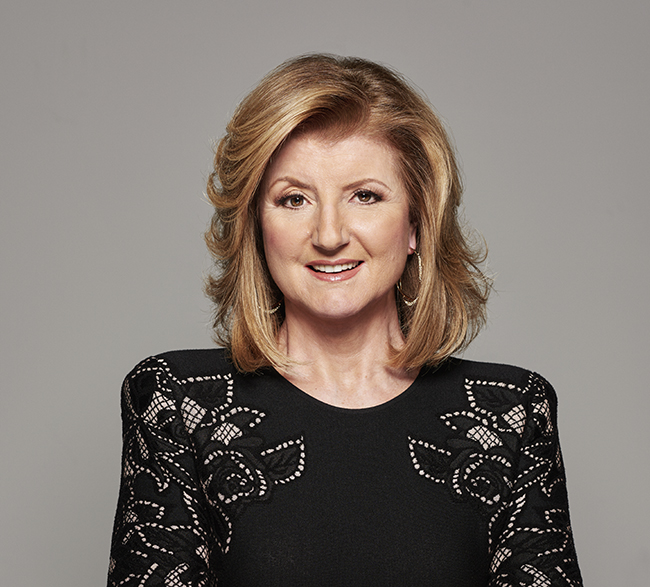
By Anthony Rapacciulio
Whether New Yorkers want to admit it or not, we are in the middle of a global sleep crisis according to Arianna Huffington in her latest book The Sleep Revolution published by Penguin Random House. I am sure many of us would agree that we could use a little extra shuteye, but honestly who has the luxury to sleep when there is so much to do and so little time?
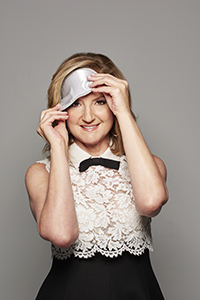
Take Mrs. Huffington for example, a renowned author, Co-Founder and Editor-in-Chief of the Huffington Post, named by Forbes Magazine as the 12th Most Influential Woman in Media and the 52nd Most Powerful Woman in the World, surely she didn’t accomplish these feats by sleeping on the job? You are right, she did not. However, in 2007 she was so exhausted and sleep deprived that she fell unconscious in her home office breaking her cheek bone and cutting her eye. This was her wakeup call, and in fact the inspiration for both her book and her new outlook on life as a self-proclaimed sleep evangelist.
We had the privilege of interviewing Arianna and learning about her childhood, her successes and failures, and of course what advice she has for those of us who live in the city that never sleeps!
Tell us how you began early in your career. What motivated you to succeed,and were there any pivotal turning points that led you to where you are today?
First, my mother. She did everything to make sure I was educated. She sold everything she had to provide for us: I remember her selling her last pair of little gold earrings to get me through school. And when I happened to see a photo of Cambridge University in a magazine, and for some reason felt that I wanted to go there, everybody laughed at me - except my mother.
Once I was at Cambridge, joining the Cambridge Union debate society helped me overcome a lifelong fear of public speaking, not to mention my crushing insecurity about my thick Greek accent - for which I was teased mercilessly. Becoming president was the start of many things - including my first book, as it was a Union debate that brought me to the attention of Reg Davis-Poynter, the British publisher who offered me a contract and set me on the path to becoming a writer.
That led to another key turning point in my life. My second book was rejected by 37 publishers. I remember running out of money and walking, depressed, down St James Street in London and seeing a Barclays Bank. I walked in and I asked to speak to the manager and asked him for a loan. Even though I did not have any assets, the banker – whose name was Ian Bell - gave me a loan. It changed my life, because it meant I could keep things together for a further 13 rejections until I finally got an acceptance.
So, very often, the difference between success and failure is perseverance. It is a case of how long we can keep going until success happens and getting up one more time than we fall down.
You have authored 15 books, which is your favorite and why?
As of right now, my favorite is the latest book, The Sleep Revolution, because we are living through such an incredible time - a golden age of sleep science that is revealing all the ways in which sleep plays a vital role in our decision making, emotional intelligence, cognitive function, and creativity.
What part of the creative process that is writing is your favorite?
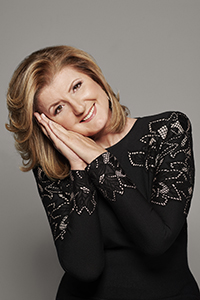
One of my favorite parts happens long before I begin writing – you might call it the gathering materials stage. For example, as I went around the world talking about my previous book Thrive, I found that the subject people wanted to discuss most—by far—was sleep: how difficult it is to get enough, how there are simply not enough hours in the day, how tough it is to wind down, how hard it is to fall asleep and stay asleep, even when we set aside enough time. And since my own transformation into a sleep evangelist, everywhere I go, someone will pull me aside and, often in hushed and conspiratorial tones, confess, “I am just not getting enough sleep. I’m exhausted all the time.” So I decided I wanted to take a fuller look at the subject because it is clear that if we are going to truly thrive, we must begin with sleep.
What effect, if any, do you feel that social media has had on journalism as an art form? Has it tarnished it by allowing anyone with internet access to post something, or has it provided an evolved canvas for creativity?
Social media, and digital media more broadly, has had a transformative effect on journalism and on our ability to make connections on a global level. It has absolutely provided a new canvas for creativity, and allowed voices that once would’ve gone unheard have a chance to join the conversation, and maybe even a chance to change the world.
And what we have seen is a convergence. The never-very-useful division between “old media” and “new media” has become increasingly blurred, as traditional outlets adopt the tools of digital journalists - including speed, transparency and engagement - while new media adopt the best practices of traditional journalism, including accuracy and fairness.
What was your inspiration for your latest book The Sleep Revolution?
It started with my own painful wakeup call. On the morning of April 6, 2007, I was lying on the floor of my home office in a pool of blood. On my way down, my head had hit the corner of my desk, cutting my eye and breaking my cheekbone. I had collapsed from exhaustion and lack of sleep. In the wake of my collapse, I found myself going from doctor to doctor, from brain MRI to CAT scan to echocardiogram, to find out if there was any underlying medical problem beyond exhaustion. There was not, but doctors’ waiting rooms, it turns out, were good places for me to ask myself a lot of questions about the kind of life I was living.
Explain what you mean by “worldwide sleep crisis” and the theory behind it.
According to a recent Gallup poll, 40 percent of all American adults are sleep-deprived, clocking significantly less than the recommended minimum seven hours of sleep per night. The crisis is global. In 2011, 32 percent of people surveyed in the United Kingdom said they had averaged less than seven hours of sleep a night in the previous six months. By 2014 that number had rocketed up to 60 percent. In 2013, more than a third of Germans and two-thirds of Japanese surveyed said they do not get sufficient sleep on weeknights. In fact, the Japanese have a term, inemuri, which roughly translates as “to be asleep while present”—that is, to be so exhausted that you fall asleep in the middle of a meeting. This has been praised as a sign of dedication and hard work—but it is actually another symptom of the sleep crisis we are finally confronting.
Can you share any secrets for those who suffer from insomnia or the like?
When I am really having trouble sleeping, or wake up with thoughts crowding my mind, I’ve found meditation to be a great remedy. And if you don’t meditate, there are many great guided meditation recordings, as well as some soothing music and other relaxing audio guides.
Those who want to explore herbal sleep aids—and especially those who want to wean themselves off sleeping pills—have many options to consider. Valerian root, for example, is a natural sedative whose use dates back to ancient Greece, where Hippocrates prescribed it in the fourth century BC. In recent years, its effectiveness has been supported by research.
The lesson here is that it is important to experiment. And the mere fact that you’re taking any deliberate action to improve your sleep means that you likely will.
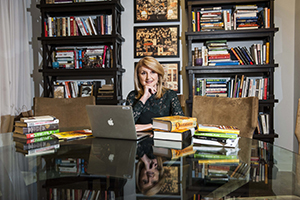
What advice would you give to people who live in “the city that never sleeps”?
Slogans like that just feed into our collective delusion that burnout is the necessary price we must pay for accomplishment and success. Recent scientific findings make it clear that this couldn’t be less true. So my advice is to shake ourselves out of this delusion by making sleep a priority. We need to reclaim the special realm of sleep because of the unique way it allows us to connect with a deeper part of ourselves.
Many New Yorkers put sleep on the back burner, some even reference the saying “I’ll sleep when I die” but what are the effects of sleep deprivation on our society and culture as a whole?
The bottom line? When we are not well rested, we are not as healthy. Lack of sleep is often the culprit behind anxiety, stress, depression, and a myriad of health problems. It is linked with increased risks of diabetes, heart attack, stroke, cancer, obesity, and Alzheimer’s disease. And as we go deeper under the hood, sleep becomes even more vital, playing a major role in brain maintenance. While we sleep, the brain is able to get rid of toxins, including proteins that are associated with Alzheimer’s disease. Which is to say, if we do not allow the brain time to do this crucial work, the cost can be high.
Many people consider you their role model, and for good reason. Who is/was your role model and why?
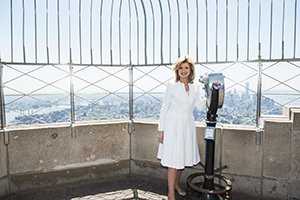
My mother. She had a gift for finding beauty in the moment. And in fact one of her favorite sayings, which embodied the philosophy of her life, was “Don’t miss the moment.” While I had the sense every time I looked at my watch that it was later than I thought, she lived in a world where there were no impersonal encounters, where a trip to the farmer’s market happily filled half a day, where there was always enough time for wonder at how lovely the rosemary looked next to the lavender. In fact, going through the market with her was like walking through the Louvre with an art connoisseur - except that you could touch and smell those still life pictures.
Tell us what your typical day is like outside of work.
My day really begins the night before, with a good night’s sleep – which, for me, means 7 to 8 hours. However, a big part of my morning ritual is about what I do not do: when I wake up, I don’t start the day by looking at my smartphone. Instead, once I am awake, I take a minute to breathe deeply, be grateful, and set my intention for the day.
At the end of the day, I treat my transition to sleep as a sacrosanct ritual. Before bed, I take a hot bath with epsom salts and a candle flickering nearby. Sometimes I have a cup of chamomile or lavender tea if I want something warm and comforting before going to bed. And I have a specific time at night when I regularly turn off my devices—and gently escort them out of my bedroom.
What is your favorite part of NYC, what do you feel separates it from other cities?
I love that it is one of the world’s great walking cities. One of my favorite phrases is solvitur ambulando—“It is solved by walking.” It refers to the fourth-century-BC Greek philosopher Diogenes’s response to the question of whether motion is real. To answer, he got up and walked. As it turns out, there are many problems for which walking is the solution. In our culture of overwork, burnout, and exhaustion, how do we tap into our creativity, our wisdom, our capacity for wonder? Solvitur ambulando.
Tell our readers what is your guilty pleasure?
People are always surprised – and really, I cannot blame them – to learn that I love country music. My iPod is full of the likes of Lucinda Williams, Emmylou Harris and Lyle Lovett.
Sound off! Your past speaks for itself, but what does the future hold for you?
My focus is on everything we are doing at The Huffington Post. This is an incredible moment at HuffPost, and I cannot wait to see what the future brings. We are poised to reach more people around the world than ever before and start conversations on the topics people care about most. The Huffington Post is making changes that will position us to be the dominant global media company in video in this ever-changing media environment. And we are doing this while doubling down on our core editorial pillars of news and politics, solutions and wellness. That includes, of course, sleep. This is why we launched the HuffPost Sleep Revolution College Tour at more than 300 colleges across the country, drawing on the latest science to raise awareness and spark a national conversation about the importance of sleep and the dangers of sleep deprivation. It has had an incredible response.
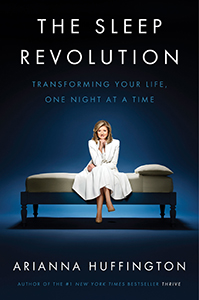
Arianna Huffington’s new book, The Sleep Revolution: Transforming your Life one Night at a Time published by Penguin Random House (ISBN-10: 1101904003) is available from amazon.com and booksellers.



